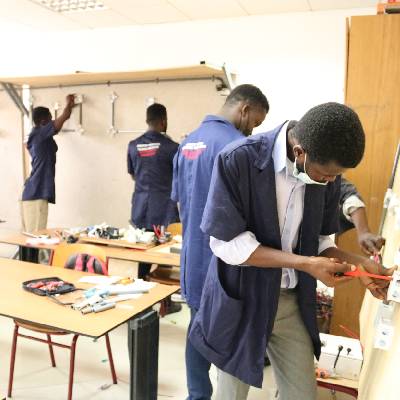
This building technology NVCET program is designed to equip trainees with knowledge and skills in the technology and management of the building industry (plumbing and masonry works).
The course trains students in constructing, deconstructing, reconstructing, renovating, altering, demolishing and maintaining or repairing building and construction works.
Career prospects:
- Mason
- Plumber
Progression path:
- Artisan Certificate in Building Technology
Entry Requirements
The Minimum Entry Requirements are:
- KCPE Certificate,
- Any other equivalent qualification as approved by KNEC.
The duration for the course is 4 years including compulsory industrial attachment
- Level one takes 2 years
- Level two takes 2 years
Objectives of Building Technology NVCET
Vocational education in building technology prepares students to work in the construction industry as masons and plumbers. Vocational education is sometimes referred to as career and technical education.
The General Education component of the curriculum aims at providing the trainee with complete secondary education in critical subjects like English Language, Economics, Physics, Chemistry, Biology, Entrepreneurial Studies and Mathematics to enhance the understanding of machines, tools and materials of their trades and their application and as a foundation for post-secondary technical education for the above-average trainee.
Hence, it is hoped that trainees who successfully complete their trade and general education may be able to compete with their secondary school counterparts for direct entry into the polytechnics or colleges of education (Technical). The Social Studies component is designed to broaden the trainee’s social skills and their understanding of the environment.
Technical and Vocational Education and Training serves multiple purposes. A key purpose is the preparation of youth for work. This takes the form of learning and developing work-related skills and mastery of underlying knowledge and scientific principles. Work is broadly defined and therefore refers to both formal employment and self-employment. To support self-employment, TVET curricula often include entrepreneurship training. Related to this is the social reproduction and transformation of occupational and vocational practices
From a development point of view, TVET facilitates economic growth by increasing the productivity of workers. The returns from increased output far exceed the costs of training, direct and indirect, leading to economic growth.
TVET like any other form of education also facilitates socio-economic development by enhancing the capacity of individuals to adopt practices that are socially worthwhile.
As a form of education similar to all others, TVET aims to develop a broad range of personal capabilities that characterize an educated person. Thus, the provision of broad-based knowledge seeks to ensure critic-creative thinking.
TVET also aims at developing capacities for effective communication and effective interpersonal relations
Related articles
-

A Guide to Civil Engineering Degree and Diploma Programs in Kenya
08-Nov-2025 -

Electrical Engineering in Kenya: A 2025 Guide for KCSE Graduates
08-Nov-2025 -

Mechanical Engineering in Kenya: A 2025 Guide for KCSE Graduates
08-Nov-2025 -

Engineering Courses in Kenya: A Guide for 2025 KCSE Graduates
08-Nov-2025 -

Education Pathways in Kenya — From Basic Education to Tertiary | College Guide
06-Nov-2025 -

The Bird and the Mirror: A Reflection on Identity, Perception, and Illusion
07-Feb-2025
Colleges offering Building Technology NVCET

Nyeri Town
The Nyeri National Polytechnic

Machakos Town
Kenya Israel Technical College

Machakos Town
Catholic Technical Training Institute

Gilgil
Comboni Polytechnic

Thika Town




